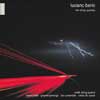Berio Chamber Works
A quartet of quartets which revealingly trace the evolution of a major composer
View record and artist detailsRecord and Artist Details
Composer or Director: Luciano Berio
Genre:
Chamber
Label: Montaigne
Magazine Review Date: 3/2003
Media Format: CD or Download
Media Runtime: 62
Mastering:
Stereo
DDD
Catalogue Number: MO782155

Tracks:
| Composition | Artist Credit |
|---|---|
| Notturno |
Luciano Berio, Composer
Arditti Qt Luciano Berio, Composer |
| Quartetto |
Luciano Berio, Composer
Arditti Qt Luciano Berio, Composer |
| Glosse |
Luciano Berio, Composer
Arditti Qt Luciano Berio, Composer |
| Sincronie |
Luciano Berio, Composer
Arditti Qt Luciano Berio, Composer |
Author: Arnold Whittall
Luciano Berio is one of the leading figures from the great, innovative generation of composers born in the 1920s – up there with Boulez and Ligeti. But recordings of his major works, especially recent ones, such as the two operas from the 1990s and several substantial vocal and orchestral scores, are notable for their absence – a serious gap which demands to be filled. On the instrumental front, at least, his major contribution, the collection of solo Sequenzas, is available in an excellent, Gramophone Award-winning DG recording (6/99). Now we have the music for string quartet which, if hardly central to Berio’s composing life, contains much that is characteristic and impressive.
The two pairs of compositions are separated by a 30-year gap, yet it is fascinating to hear how clearly Sincronie (1963-64) anticipates the manner of Notturno (1993) in the wide range of its materials, from simple to complex, and the skill with which a large-scale single-movement structure is balanced and sustained. The Quartetto from 1956 is virtually an apprentice work, though this apprentice already has a distinctive personality, despite the dutiful echoes of Webern and Boulez. What Quartetto lacks is the imaginative fluency which the most recent score in this programme, Glosse (1997), has in abundance, sketching an expressive world in which refinement and ruggedness can not only coexist but also engage in constructive dialogues.
Sincronie and Notturno are much more than sketches, and it’s here that we find Berio at his best. Just as Sincronie uses its initial perception about the homogeneity of the four string instruments as the starting point for an enthrallingly spontaneous journey which never loses its sense of direction, so Notturno ventures well beyond the connotations of tranquil repose into the kind of dark, concentrated volatility which Berio has made his own. Notturno was recorded some years ago by the Alban Berg Quartet (EMI, 10/95), but their bold pairing – late Haydn – provides a rather less persuasive context than the Arditti’s all-Berio programme. These new performances are no less persuasive, bringing the music to full and fascinating life, with the help of a recording that is well-nigh ideal in its attention to detail and easy embrace of the music’s phenomenally wide dynamic and textural range.
The two pairs of compositions are separated by a 30-year gap, yet it is fascinating to hear how clearly Sincronie (1963-64) anticipates the manner of Notturno (1993) in the wide range of its materials, from simple to complex, and the skill with which a large-scale single-movement structure is balanced and sustained. The Quartetto from 1956 is virtually an apprentice work, though this apprentice already has a distinctive personality, despite the dutiful echoes of Webern and Boulez. What Quartetto lacks is the imaginative fluency which the most recent score in this programme, Glosse (1997), has in abundance, sketching an expressive world in which refinement and ruggedness can not only coexist but also engage in constructive dialogues.
Sincronie and Notturno are much more than sketches, and it’s here that we find Berio at his best. Just as Sincronie uses its initial perception about the homogeneity of the four string instruments as the starting point for an enthrallingly spontaneous journey which never loses its sense of direction, so Notturno ventures well beyond the connotations of tranquil repose into the kind of dark, concentrated volatility which Berio has made his own. Notturno was recorded some years ago by the Alban Berg Quartet (EMI, 10/95), but their bold pairing – late Haydn – provides a rather less persuasive context than the Arditti’s all-Berio programme. These new performances are no less persuasive, bringing the music to full and fascinating life, with the help of a recording that is well-nigh ideal in its attention to detail and easy embrace of the music’s phenomenally wide dynamic and textural range.
Discover the world's largest classical music catalogue with Presto Music.

Gramophone Digital Club
- Digital Edition
- Digital Archive
- Reviews Database
- Full website access
From £8.75 / month
Subscribe
Gramophone Full Club
- Print Edition
- Digital Edition
- Digital Archive
- Reviews Database
- Full website access
From £11.00 / month
Subscribe
If you are a library, university or other organisation that would be interested in an institutional subscription to Gramophone please click here for further information.




